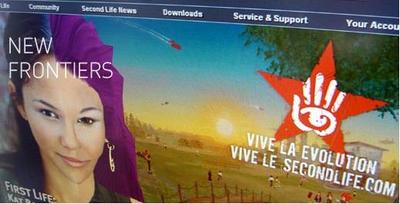Looking for a virtual escape
 The phenomenon "virtual community" reflects the social, political and economic impact of information and communications technology changing the architecture of interaction.
The phenomenon "virtual community" reflects the social, political and economic impact of information and communications technology changing the architecture of interaction.Imagine a 3D digital world created and owned by its Residents. This world really is whatever you make it, and your experience is what you want out of it. Participants will truly take on a second life, an escape to a place full of people, activity and possibility. From the freedom of creating a personal identity and claiming virtual land to the responsibilities of earning money and maintaining one's health to the social implications of joining a community and collaborating with others, residents will face a host of choices daily.Linden Lab has created Second Life as the next evolutionary leap in the formation of virtual communities. Second Life is what's known as a "metaverse," an alternative universe that exists along-side and somewhat outside of the real world. It's a simulation of the world, in which you create a character for yourself and then wander around the many spaces of Second Life. Second Life shares some of the qualities of a MMORPG (a massively-multiplayer online role-playing game), in that it features avatar construction and personalization, a vast array of spaces to explore, a huge number of other players to interact with, the ability to design and resell 3D content, combined with the ability to own and develop land and a microcurrency, which can be exchanged to real money... means that you can build a real business entirely within Second Life.
It is important to see how virtual communities are located at the boundary between formal organizations and social groups that exist despite the absence of any authority. I'm just worried it will end up taking too much time out of your real life!
